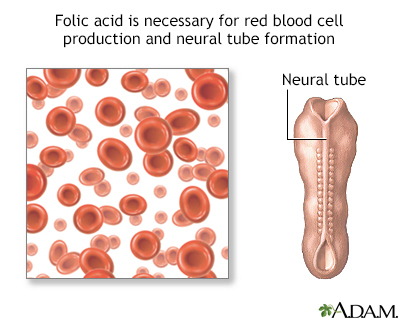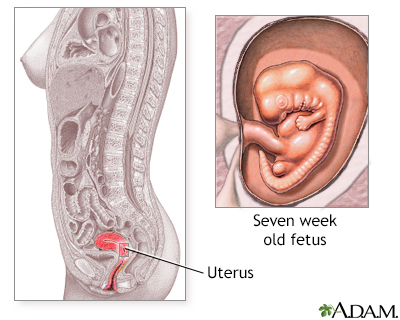5 Tips for Reducing Birth Defect Risks
January is National Birth Defects awareness month. Birth defects affect roughly every 1 in 33 born in the United States each year. Some birth defects are…

Update your location to show providers, locations, and services closest to you.
Prevention of birth defects with folic acid (folate)
Taking folic acid before and during pregnancy can reduce the risk of certain birth defects. These include spina bifida, anencephaly, and some heart defects.
Experts recommend women who can become pregnant or who plan to become pregnant take at least 400 micrograms (µg) of folic acid every day, even if they are not expecting to become pregnant.
This is because many pregnancies are unplanned. Also, birth defects often occur in the early days before you may know you are pregnant.
If you become pregnant, you should take a prenatal vitamin, which will include folic acid. Most prenatal vitamins contain 800 to 1000 mcg of folic acid. Taking a multivitamin with folic acid helps ensure that you get all the nutrients you need during pregnancy.
Women with a history of delivering a baby with a neural tube defect may need a higher dose of folic acid. If you have had a baby with a neural tube defect, you should take 400 µg of folic acid every day, even when you are not planning to become pregnant. If you plan to become pregnant, you should talk to your doctor about whether you should increase your folic acid intake to 4 milligrams (mg) each day during the month before you become pregnant until at least the 12th week of pregnancy.



Berger DS, West EH. Nutrition during pregnancy. In: Landon MB, Galan HL, Jauniaux ERM, et al, eds. Gabbe's Obstetrics: Normal and Problem Pregnancies. 8th ed. Philadelphia, PA: Elsevier; 2021:chap 6.
Carlson BM. Developmental disorders: causes, mechanisms, and patterns. In: Carlson BM, ed. Human Embryology and Developmental Biology. 6th ed. St Louis, MO: Elsevier; 2019:chap 8.
Copp AJ, Greene NDE. Pathophysiology of neural tube defects. In: Polin RA, Abman SH, Rowitch DH, Benitz WE, Fox WW, eds. Fetal and Neonatal Physiology. 6th ed. Philadelphia, PA: Elsevier; 2022:chap 169.
US Preventive Services Task Force; Bibbins-Domingo K, Grossman DC, et al. Folic acid for the prevention of neural tube defects: US Preventive Services Task Force Recommendation Statement. JAMA. 2017;317(2):183-189. PMID: 28097362 pubmed.ncbi.nlm.nih.gov/28097362/.

January is National Birth Defects awareness month. Birth defects affect roughly every 1 in 33 born in the United States each year. Some birth defects are…

January is a month to start anew, refresh commitments and kick off the year with a clean slate and healthy habits. It’s also dedicated to two parts of…

January is a month to start anew, refresh commitments and kick off the year with a clean slate and healthy habits. It’s also dedicated to two parts of pregnancy that go hand-in-hand: folic acid and...
One of the loftiest goals in medicine is to find simple solutions to serious problems. Case in point — the B-vitamin called folic acid. When pregnant women get enough, their babies have a 70...